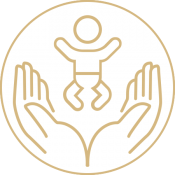Maternal Wellness
We have had a high level of success helping women with:
Postpartum depression, anxiety, OCD, bipolar, psychosis, and birth-related trauma support, mood regulation during hormonal changes
(PMS, pregnancy, menopause, etc.) and more.

Some Important Facts About Perinatal Disorders:
- You or someone you know may have a perinatal disorder if after a month postpartum she shows signs of anger, anxiety, overwhelm, deep sadness, lowered feelings of self-worth and self‐esteem, “nerve” problems, “things that are usually easy are very difficult,” putting herself down, fears of baby’s rejection, not feeling deserving of being a mother, etc. You can help her by offering support and guiding her to an appropriate professional trained in these areas.
- There is a high incidence of postpartum in society‐at‐large and in our own communities in particular (approx. 10%-15%).
- Perinatal issues (postpartum depression and related disorders) occur in all kinds of mothers. Sufferers may be embarrassed to open up to others, afraid they’re “crazy,” or their feelings are “bad.” It is no fault of her own: she did not cause this. It is critical that she talk to someone about experiences that don’t feel good or “right” after birth.
- Postpartum diagnoses can be alleviated more quickly when the person starts the process of recovery early. Once she is aware of what she has and seeks proper help and support, she can recover, 100%.
- If the problem getting in the way of:
a) one’s daily functioning,
b) attitude about the baby,
c) self‐care,
d) feelings of competency, encourage the mother to get immediate support. - A caring and understanding health professional is an essential part of perinatal wellness. (This person may not be the obstetrician or gynecologist – she may be a doula, midwife, massage therapist, friend, mentor, etc.)
Often, “the winning formula” includes: a brief medication regimen, talk therapy, behavioral interventions, good spousal/familial/friendly support, a good diet, sleep, exercise, and possible alternative therapies (such as light therapy, omega fish oils, vitamin, herbal or mineral supplements, etc.)



